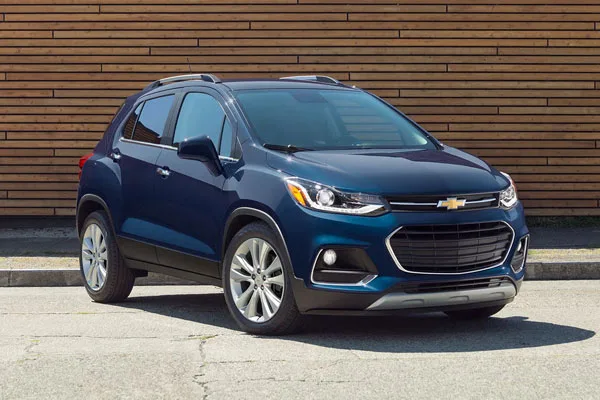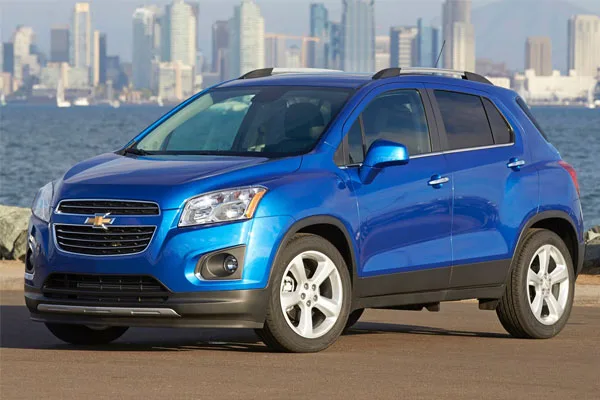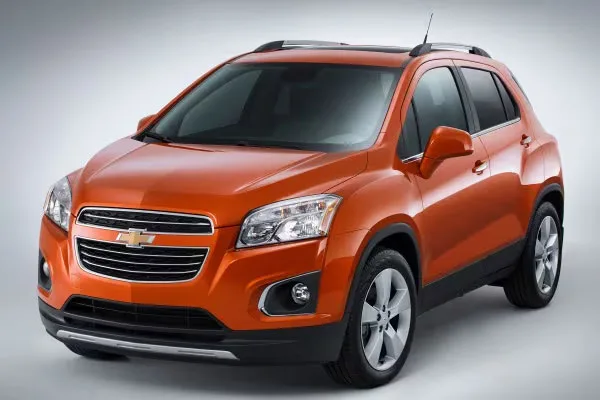I’m a huge Chevrolet fan!
But the 2024 Chevy Trax disappointed me a lot. At first, it seemed like a sharp city-sized SUV. However, within just a few weeks, I was overwhelmed by numerous repair bills. From sluggish transmission to bad interior, my car was at the garage every other day for a new problem.
All this ultimately led to selling my 2024 Chevy Trax. I want someone else not to fall into this beautiful SUV trap, so I wrote this article. Below, I’ll discuss the problems I faced in the 2024 Trax and will also mention other model years you should avoid.
If you want to buy a new or used Chevy Trax, you should read this article till the end to make the right decision.
Chevy Trax Red Flags: The Worst Years You Should Avoid

Why I Regret Buying the 2024 Chevy Trax?
My bad experience with the 2024 Chevy Trax sparked all the debate. Below, I’ve gathered the issues I faced with this car.
1. Lack of Performance
The elephant-sized problem I faced in the car was under its hood. Inside, the 2024 Chevy Trax features a 1.2-litre three-cylinder turbocharged engine that produces 137 horsepower and 162 lb-ft of torque.
The reason I bought the car was that Chevy promised the Trax would be their fastest SUV. But it was not true.
On paper, the car loses 18 horsepower and 15 lb-ft of torque compared to the previous generation. However, for a crossover SUV like Trax, this performance has always been underwhelming.
2. Transmission Disappoints Me a Lot
Not only is the performance disappointing, but the 2024 Trax’s 6-speed automatic transmission also disappoints me a lot. While it’s arguably better than continuous variable transmission, I still faced several issues with it.
One major problem I faced was not being responsive quickly. Whenever I tried to slow down the car to give way to a vehicle on the highway, I felt the downshift was not very quick.
It completely ruined my driving experience.
3. No All-Wheel Drive Option
I thought I had bought a complete SUV in the form of the 2024 Chevy Trax. But I was wrong. A complete SUV comes with an All-Wheel drive option, offering capabilities such as improved traction, handling, and confidence in harsh conditions, which is absent in the 2024 Trax.
An SUV without AWD is akin to a tall hatchback without usability in real-world conditions, such as rain, snow, gravel, and light off-roading. This realization hit me hard as I was no longer able to enjoy off-roading with my friends.
4. Cheap Interior
I wasn’t aware of the crucial information that an obvious glaring flaw in every GM product is the existence of cheap plastics and terrible switchgear. I was expecting the interior quality of an Audi or Mercedes.
But it was my biggest mistake, as the 2024 Trax doesn’t even meet the basic standards of today’s market. Other aspects also need improvement, such as the climate vents receiving small colored fins, the door cards gaining more texturing, and the seats incorporating unique patterns.
I purchased the entry-level LS model, which comes with a basic display, along with a smaller 8.0-inch, old-generation touchscreen. In contrast, the higher models feature a fully digitized dash with an 8-inch driver display and an 11.0-inch central screen.
2024 Model Specifications
| Engine Type | 1.2-liter inline 3-cylinder |
| Base Engine Type | Gas |
| Valves | 12 |
| Horsepower | 137 hp at 5,000 rpm |
| Torque | 162 lb-ft at 2,500 rpm |
| Transmission | 6-speed shiftable automatic |
| Drivetrain Options | Front-Wheel Drive |
| Fuel Tank Capacity | 13.2 gallons |
| Mileage | 30 miles per gallon |
| Seating Capacity | 5 passengers |
| Cargo Capacity | 25.6 cubic feet behind rear seats |
| Front Legroom | 41.9 inches |
| Rear Legroom | 38.7 inches |
| Safety Features |
|
| Infotainment and Connectivity |
|

2018 Chevrolet Trax Problems: Why You Should Avoid This Model
With just 80 NHTSA complaints and two recalls, the 2018 Trax can be a safer option for those who are looking to buy a used car. However, I still recommend choosing higher models only. Below are the reasons why you should do so.
1. Electrical Issues
Most of the owners complained about electrical issues in the 2018 Trax that even shut off the engine and infotainment system. They claimed that the car lost electrical power and stalled without any warning.
They also couldn’t even turn on the hazard light, which could be dangerous when you’re driving in a near-zero visibility area. To resolve this issue, owners reported that they had to turn off the engine and then restart it.
But it is just a temporary solution.
2. Suspension Problems
The suspension problems in the 2018 Chevy Trax led to its two recalls. According to the recalls, the 2018 Trax’s front suspension has been welded improperly, making it harder to steer.
It eventually increases the risk of a crash.
2018 Model Specifications
| Engine Type | 1.4-liter inline 4-cylinder |
| Base Engine Type | Gas |
| Valves | 16 |
| Horsepower | 138 hp at 4,900 rpm |
| Torque | 148 lb-ft at 1,850 rpm |
| Transmission | 6-speed shiftable automatic |
| Drivetrain Options | Front-Wheel Drive |
| Fuel Tank Capacity | 14.0 gallons |
| Mileage | 28 miles per gallon |
| Seating Capacity | 5 passengers |
| Cargo Capacity | 18.7 cubic feet behind rear seats |
| Front Legroom | 40.8 inches |
| Rear Legroom | 35.7 inches |
| Safety Features |
|
| Infotainment and Connectivity |
|

2017 Chevy Trax Owners Nightmares: Real Problems You Should Know
Let me provide you with real-life experiences owners shared with the 2017 Chevy Trax.
1. Everything under the Hood needs to be replaced
“It had not even been three years since I bought the car, and I was already noticing problems with it. Almost everything under the hood needs to be repaired”.
The entire air conditioning system needed to be replaced. The radiator, head gaskets, oil filter housing gaskets, oil cooler, and a few other components also need to be repaired or replaced.
I spent almost half of my hard-earned money to get my car repaired, and then, a few months later, a stability warning appeared. The turbo engine began to overheat, cracks appeared, and there was a leak everywhere.
My car mechanic even begged me to get rid of this car.
Nykolle, a 2017 Chevy Trax owner, shared this review on cars.com
2. Mechanical Nightmare
Another 2017 Trax owner also shared a bad experience with this car. “I bought the car with only 10 miles on the odometer, but in a few months, it became a mechanical nightmare for me”.
There were constant breakdowns and hefty repair bills, which have left me deeply disappointed and filled with regret. The first major issue that appeared on the car was engine failure at 90,000 miles.
It was a shock that a new and well-maintained car had this issue. I had to replace the engine. The new engine performed very well under various conditions, and I was pleased with its performance.
However, my happiness was short-lived, as the transmission failed at 105,000 miles. It was a shock again, as this issue appeared on a car that was only used for regular commuting and not for any heavy-duty driving.
After another pricey repair, my Chevy Trax was back on the road. Unfortunately, at 190,000 miles, the second transmission occurred. It was clear that the transmission couldn’t even handle the basic weight of a car.
The constant transmission issues, coupled with unexpected engine failure, made my experience with the 2017 Chevrolet Trax a disappointing one. I would not recommend this car to anyone, not even my worst enemy.
Upset Traxxer from Washington State shared this review on cars.com
3. Leakage! Leakage! Leakage!
It had not even been six months since I bought the car, and the leakage started happening in the car. I repaired the leak, but it reappeared within less than a month. I noticed that it was happening when I was using the air conditioning system.
I took the car to the mechanic, and he informed me that we didn’t know where the leakage was happening, so I had to pay $300 to run a diagnostic test on my car. It was all a bit confusing. I did not understand why it was leaking, as I haven’t travelled far.
Amanda from Dallas shared this review on cars.com
2017 Model Specifications
| Engine Type | 1.4-liter inline 4-cylinder |
| Base Engine Type | Gas |
| Valves | 16 |
| Horsepower | 138 hp at 4,900 rpm |
| Torque | 148 lb-ft at 1,850 rpm |
| Transmission | 6-speed shiftable automatic |
| Drivetrain Options | Front-Wheel Drive |
| Fuel Tank Capacity | 14.0 gallons |
| Mileage | 28 miles per gallon |
| Seating Capacity | 5 passengers |
| Cargo Capacity | 18.7 cubic feet behind rear seats |
| Front Legroom | 40.8 inches |
| Rear Legroom | 35.7 inches |
| Safety Features |
|
| Infotainment and Connectivity |
|

2016 Chevy Trax Reliability Issues You Shouldn’t Ignore
According to CarComplaints, the 2016 Trax is considered the worst model year of the Chevrolet Trax. It has received over 150 NHTSA complaints and has been subject to five recalls.
1. Faulty Air Conditioning System
The primary issue found in this car was the faulty air conditioning system. Many owners reported that their air conditioning systems suddenly stopped working while driving. The common reasons behind this were refrigerant leaks, electrical issues with the climate control system, and a broken air compressor.
2. Engine failure
Another major problem found in this car was engine failure. Most of the owners claimed that the engine light went off, which ultimately led to engine failure. Some owners reported that their car’s engine lost power while driving on the highway.
2016 Model Specifications
| Engine Type | 1.4-liter inline 4-cylinder |
| Base Engine Type | Gas |
| Valves | 16 |
| Horsepower | 138 hp at 4,900 rpm |
| Torque | 148 lb-ft at 1,850 rpm |
| Transmission | 6-speed automatic |
| Drivetrain Options | Front-Wheel Drive |
| Fuel Tank Capacity | 14.0 gallons |
| Mileage | 29 miles per gallon |
| Seating Capacity | 5 passengers |
| Cargo Capacity | 18.7 cubic feet behind rear seats |
| Front Legroom | 40.8 inches |
| Rear Legroom | 35.7 inches |
| Safety Features |
|
| Infotainment and Connectivity |
|

2015 Chevy Trax: Hidden Issues Behind this Top-Rated SUV
According to critics and US news, the 2015 Chevy Trax received an overall rating of 8.3 out of 10, making it a top-rated affordable subcompact SUV. Unfortunately, it is also the same model that received the most complaints.
1. Leaky Engine
A 2015 Chevy Trax owner claimed I’ve never seen a car with so many repair issues. I drove the car for only 70,000 miles and had to get it repaired thrice for oil leaks from different areas. I’ve already spent over $5,000 on repairs, but I’m still facing the issue with the leaky engine.
I fixed the leaky engine, but then the shifter broke down, resulting in another $1,500 repair bill. What a piece of crap I bought? From now on, I will refrain from using GM products.
EF from Macomb, Michigan, a 2015 Chevy Trax owner, shared this review on cars.com
2. Rolled back on Inclined Roads
Most of the complaints registered against the 2015 Chevy Trax were about rolling back down inclined roads. Some owners reported that the car suddenly stopped on inclined roads and began moving backwards.
One owner said that my car rolled down a road that was not even steeply inclined. According to experts, this occurs when there is an issue with the transmission.
2015 Model Specifications
| Engine Type | 1.4-liter inline 4-cylinder |
| Base Engine Type | Gas |
| Valves | 16 |
| Horsepower | 138 hp at 4,900 rpm |
| Torque | 148 lb-ft at 1,850 rpm |
| Transmission | 6-speed automatic |
| Drivetrain Options | Front-Wheel Drive |
| Fuel Tank Capacity | 14.0 gallons |
| Mileage | 29 miles per gallon |
| Seating Capacity | 5 passengers |
| Cargo Capacity | 18.7 cubic feet behind rear seats |
| Front Legroom | 40.8 inches |
| Rear Legroom | 35.7 inches |
| Safety Features |
|
| Infotainment and Connectivity |
|
From 2015 to 2024: Chevy Trax Generations Compared
| Specifications | 2015 | 2016 | 2017 | 2018 | 2024 |
|---|---|---|---|---|---|
| Engine Type | 1.4-liter inline 4-cylinder | 1.4-liter inline 4-cylinder | 1.4-liter inline 4-cylinder | 1.4-liter inline 4-cylinder | 1.2-liter inline 4-cylinder |
| Base Engine Type | Gas | Gas | Gas | Gas | Gas |
| Valves | 16 | 16 | 16 | 16 | 12 |
| Horsepower | 138 hp at 4,900 rpm | 138 hp at 4,900 rpm | 138 hp at 4,900 rpm | 138 hp at 4,900 rpm | 137 hp at 5,000 rpm |
| Torque | 148 lb-ft at 1,850 rpm | 148 lb-ft at 1,850 rpm | 148 lb-ft at 1,850 rpm | 148 lb-ft at 1,850 rpm | 162 lb-ft at 2,500 rpm |
| Transmission | 6-speed automatic | 6-speed automatic | 6-speed shiftable automatic | 6-speed shiftable automatic | 6-speed shiftable automatic |
| Drivetrain Options | Front wheel drive | Front wheel drive | Front wheel drive | Front wheel drive | Front wheel drive |
| Fuel Tank Capacity | 14.0 gal | 14.0 gal | 14.0 gal | 14.0 gal | 13.2 gal |
| Mileage (MPG) | 26 city / 34 highway | 26 city / 34 highway | 25 city / 33 highway | 25 city / 33 highway | 28 city / 32 highway |
Which Chevy Trax Years are Reliable?
Here are some Chevy Trax years that critics and customers alike consider reliable and safer to buy.
- 2019
- 2020
- 2022
- 2025
These model years don’t have any significant issues. Many owners have a great experience driving it due to its reliability, build quality, and other minor improvements.
The 2019 Chevy Trax has received a rating of 4 out of 5. Most of the owners claimed that they love driving the car, with very little cabin noise, making it a comfortable ride. Some owners are also satisfied with its safety features.
On the other hand, the 2020 Chevy Trax received 5-star ratings from the NHTSA (National Highway Traffic Safety Administration) after passing the safety crash test. However, in the test, it lagged in some vital driver assistance features.
The 2022 Chevy Trax won’t disappoint with its performance, thanks to its turbocharged 1.4-litre EcoTec engine, coupled with an electronically controlled six-speed automatic transmission, which provides an impressive EPA rating of 31 miles per gallon on the highway and 26 miles per gallon in the city.
The 2025 Chevy Trax boasts one of the lowest starting prices among subcompact SUVs. It mainly concentrates on jam-packed standard features and neck-snapping styling. Many owners claimed that it provides impressive engine performance and fuel economy.
There are a few minor issues some owners faced with this car. But its positives far outweigh the few negatives.
Wrapping Up
If you’re aware of the Trax model years you need to avoid, the Chevy Trax can be a good and economical pick. I have shared genuine reviews from real users on the internet, so you can trust the information and make an informed decision.
However, everyone has their taste, so it’s up to you to choose what you like and what you avoid. Do your complete search and talk to the experts before making any decision, as you’re going to spend your hard-earned money.
Sources: cars.com, CoPilot, Car And Driver, Edmunds, YouTube
Frequently Asked Questions
1. What are the Worst Years for the Chevy Trax?
The worst years for the Chevy Trax are generally considered to be 2015, 2016, 2017, 2018 and 2024 due to recurring issues with engine performance, electrical faults, leakage and transmission failure.
2. Why Should I Avoid the 2015 Chevy Trax?
The 2015 model is plagued by a leaky engine and transmission failure.
3. Which Chevy Trax Years are Safe to Buy?
The 2019, 2020, 2022 and 2025 models tend to have better reliability ratings and fewer serious complaints.
4. Does the Chevy Trax have Engine Issues?
Yes, especially in older models (2015–2016), where common issues include turbocharger failure, oil leaks, and engine stalling.
5. Is the Chevy Trax a Good Long-Term Investment?
Only certain model years are worth considering for long-term use. Buyers should avoid the troubled years and focus on models with improved reliability and updated features.























